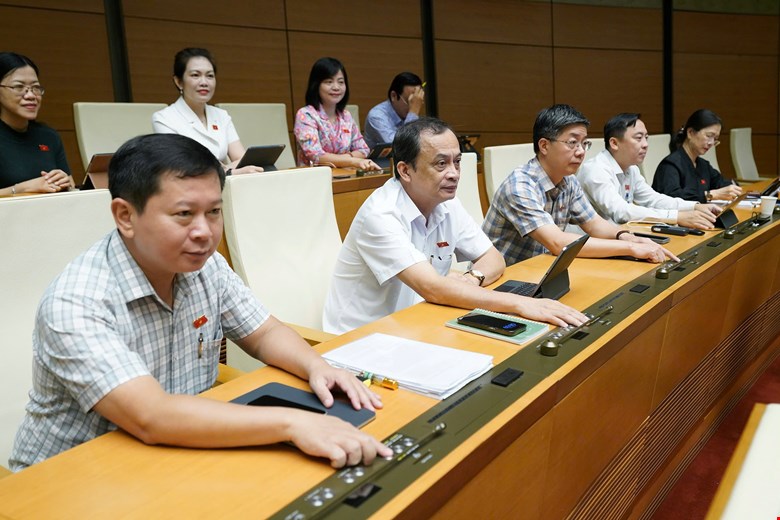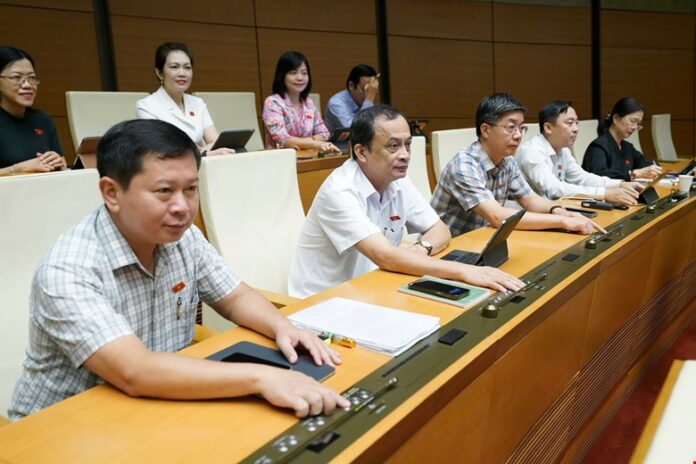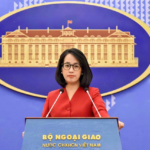The Digital Technology Industry Law and the Recognition of Digital Assets
Vietnam’s National Assembly has officially recognized digital assets with the passing of the Digital Technology Industry Law. This law, which was approved on June 14, 2025, will come into effect on January 1, 2026.
Chapter V of the Digital Technology Industry Law specifically addresses digital assets, defining them as assets under the Civil Code, represented in digital form, and created, issued, stored, transferred, and authenticated by digital technology in an electronic environment.

National Assembly deputies voting to pass the Law on Digital Technology Industry. Photo: Pham Thang
Digital assets can be classified according to one or more of the following criteria: purpose of use, technology used, and other relevant criteria.
Digital assets include virtual assets in an electronic environment that can be used for exchange or investment purposes. However, virtual assets do not encompass securities, legal tender, or other financial assets as defined by civil and financial laws.
Encrypted assets, another type of digital asset, utilize encryption or similar digital technology for authentication during creation, issuance, storage, and transfer. Similar to virtual assets, encrypted assets exclude securities, legal tender, and other financial assets defined by civil and financial laws.
The Digital Technology Industry Law also outlines fundamental principles for the management of digital assets, including their creation, issuance, storage, transfer, and ownership establishment. It addresses the rights and obligations of involved parties, ensures network security and prevents money laundering, terrorist financing, and the proliferation of weapons of mass destruction. The law also covers inspection and handling of violations, business conditions for encrypted asset service providers, and other management-related matters.
The law delegates the government to issue detailed regulations to ensure practicality and effective management across various sectors and fields.
Before the law was passed, Le Quang Huy, Chairman of the National Assembly’s Committee for Science, Technology, and Environment, presented a report incorporating feedback and explanations on certain issues, including digital assets.
According to Mr. Huy, some opinions suggested constructing a comprehensive legal framework for digital assets that delineates core issues such as property rights, ownership, transactions, security, responsibility, dispute resolution, and risk management. It was also recommended to establish a management, supervision, and risk prevention mechanism.
Some delegates also requested clarification on whether digital assets could be used for exchange or investment purposes and sought to define the scope and classification criteria for digital assets.
In response, the National Assembly Standing Committee asserted that the draft law already defines digital assets in accordance with current civil law. Matters concerning property rights, ownership, transactions, security, responsibility, and dispute resolution are governed by criminal law, anti-corruption law, anti-money laundering law, and other relevant legislation.
To ensure feasibility, flexibility, and legal system stability, the draft law provides only fundamental principles on this matter and authorizes the government to issue specific regulations that align with practical developments.
Taking into account the feedback from the National Assembly delegates, the draft law has been revised to include more detailed core content on state management of digital assets. It also delegates the government to specify authorities, management content, and classification of digital assets to match practical needs and management requirements across sectors and fields.
“Vietnam Joins the Ranks: A New BRICS Partner”
Vietnam has officially become a BRICS Partner Country – a prestigious group of the world’s leading emerging economies. This is a significant milestone in Vietnam’s foreign policy, showcasing its ambition to strengthen the role and voice of developing nations on the global stage.
Pondering the Pork Conundrum: Hot or Cold?
Recent social media posts have caused a stir, with claims and images suggesting that pork supplied by C.P. Vietnam may be contaminated. The Ministry of Agriculture and Environment has referred the case to the police for investigation. This incident raises a critical question: How is the quality of pork, a staple food for many, being monitored and regulated?
“12-Ton Chemical Powder Mix Scandal: Wholesale by the Pound, Over 100,000 Orders Fulfilled”
As of their apprehension, the culprits confessed to having sold over 100,000 orders of their illicit products nationwide, raking in an estimated 10 billion VND in profits.
Motorcycle Prices Slashed: Honda’s Hottest Bikes Now Up to 10 Million VND Cheaper than Tag Price
The Vietnamese motorcycle market is witnessing an unusual deep price correction in early June 2025. Contrary to the usual scenario of “sold-out and price-hiked” situations, a range of Honda models, from common scooters to sports bikes, are being offered by dealerships at significantly lower prices than the official tags.





















